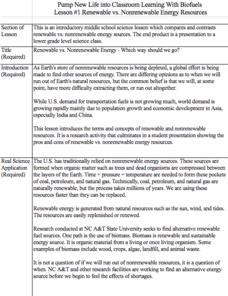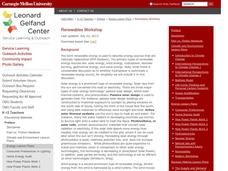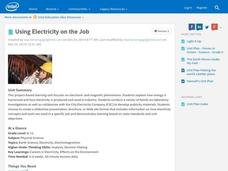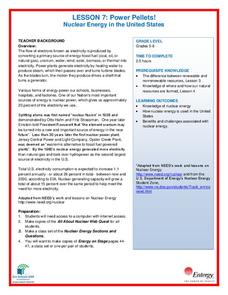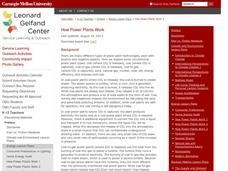Carnegie Mellon University
Understanding Electricity Mix Tradeoffs
Use the accompanying presentation and colorful technology sheets to introduce your class to the 10 different energy technologies. Connect kids to an interactive computer tool that allows them to combine different types of power...
National Wildlife Federation
An Energy Mix: Renewable and Nonrenewable Resources
What did the windmill say about renewable energy? I'm a BIG fan! Lesson three in the series of 12 has classes discuss potential and kinetic energy and then, in pairs, they complete a web quest over the different types of energy...
Kenan Fellows
Renewable vs. Nonrenewable Energy Resources
Is one type of energy inherently good or bad? Young scientists explore energy resources in a week-long unit. After extensive research, groups create powerful position statements and presentations supporting their energy resource of choice.
Curated OER
Sources of Energy
Fifth graders take a close look at how energy changes from one form to another within their surroundings. They also study the ten different sources of energy and determine which are renewable and which are non-renewable. This seven-page...
Curated OER
Filling Up-Gasoline
In this fuel sources worksheet, students calculate the E85 alternative fuel costs per gallon compared to the cost of gasoline. Students complete a table to show the comparison prices. They create a triple line graph to show the...
Curated OER
Producing Energy From Fossil Fuels and Renewable Sources
All types of energy are presented here, with neat pictures and labels to illustrate the technology typically used. Ways of harnessing the energy most efficiently are discussed, and good examples provide starters for further research....
Curated OER
Green Chemistry
The principles of pollution control on a molecular level are summarised here. The reasoning and study behind the principles are described, and your class will undestand how some techniques are developed to be more efficient.
Curated OER
Wetland vs. Stream Macroinvertebrates
A link to a comprehensive macroinvertebrate guide gives you the information needed to prepare for this field study activity. Sample macroinvertebrates are collected from areas representing different environmental conditions. Junior...
Carnegie Mellon University
Renewables Workshop
Youngsters examine resource maps to find out which states are using solar and wind power and discuss as a class various other renewable energy sources. They use a provided data table to record pros and cons to each technology, build and...
Texas State Energy Conservation Office
Investigation: Concept Mapping Fuels
After reading an article, "Fuels for Everything," collaborative groups create a concept map poster of the transportation and non-transportation fuels. This makes a strong introduction to the different types of fuels used for transportion...
It's About Time
Energy Flow in Ecosystems
Emerging biochemists more fully understand the flow of energy in ecosystems as they explore the laws of thermodynamics and relate them to energy transfer in food chains. They also investigate heat loss from the human body and how...
Consumers Energy
The Cost of Electricity
How much is your toaster costing you every day? Young environmentalists calculate the monetary costs of household appliances based on their average consumption of wattage.
National Energy Education Development Project
Introduction to Solar Energy
People have been using solar energy for many generations to dry crops, heat homes, and for light. This presentation explains how now it is possible to capture the solar energy and store it for future use, details how and where people use...
Intel
Using Electricity on the Job
Learners explore electricity, discussing its importance and researching different ways in which electricity can be generated. Groups present their findings to the class and then create publicity materials which promote and educate about...
National Wildlife Federation
Power Pellets! Nuclear Energy in the United States
Nuclear power provides about 20 percent of the energy generated in the United States. The seventh activity in the series of 12 tackles nuclear power. After sharing what they know about nuclear energy, scholars complete a WebQuest make a...
Serendip
Photosynthesis and Cellular Respiration
How does energy from the sun make plants grow? Scholars move step by step through the processes that promote plant propagation during a detailed lesson. The resource illustrates ADP production and hydrolysis, then allows learners to...
Curated OER
Bugs, Bugs, Everywhere!
Students collect and compare bugs using magnifying lenses and graph data based on their comparisons. In this bugs lesson plan, students also make an aspirator by using a jar, tubing, and screen.
Curated OER
Empty Oceans
In groups of four, pupils brainstorm about seafood. They view the Monterey Bay Aquarium Seafood Watch website to examine the problems caused by the seafood industry. Learners are then brought back together to discuss what they...
Curated OER
Great Lakes Food Web
Young scholars identify species and components of a Great Lakes food web. Using note cards, they place themselves in the correct order of the food chain based on the species present. They discuss what they believe happens to various...
Carnegie Mellon University
How Power Plants Work 1
First of three lessons, this is a great start to a unit on energy. As you demonstrate, learners discover different types of energy and how it is converted from one form to another. They then focus in on the generation of electricity by...
Carnegie Mellon University
How Power Plants Work 2
In this second of three lessons on power plants, future engineers find out how we generate electricity and how coal-powered plants operate. They work in small groups to make electromagnet generators to light LED bulbs. A set of...
Carnegie Mellon University
How Power Plants Work 3
Double, double toil and trouble, fire burn and cauldron bubble! Find out what drives a turbine to generate electricity and whether or not it has an impact on the environment. A discussion and lecture is divided by a hands-on activity in...
Curated OER
Energy Alternatives Explorations
In this energy alternatives explorations worksheet, students explore alternative energy sources by using the linked web resources to answer 8 questions about different resources and identify the ones that would work in their community.
Curated OER
Teaching about the Effect of Photosynthesis and
Students demonstrate the effects of photosynthesis and respiration. They decide which variables to analyze in a microcosm study. They produce a written paper, oral presentation, poster, or multi-media presentation
Other popular searches
- Biomass Energy
- Biomass Energy Pyramid
- Pyramid of Biomass
- Biomass Pyramids
- Biomass Fuel
- Pyramid Biomass
- Aquatic Biomass
- Estuarine Biomass
- Biomass Energy Advantages
- Biomass Energy Quiz
- Biomass Energy Powerpoint
- Html Biomass Energy




